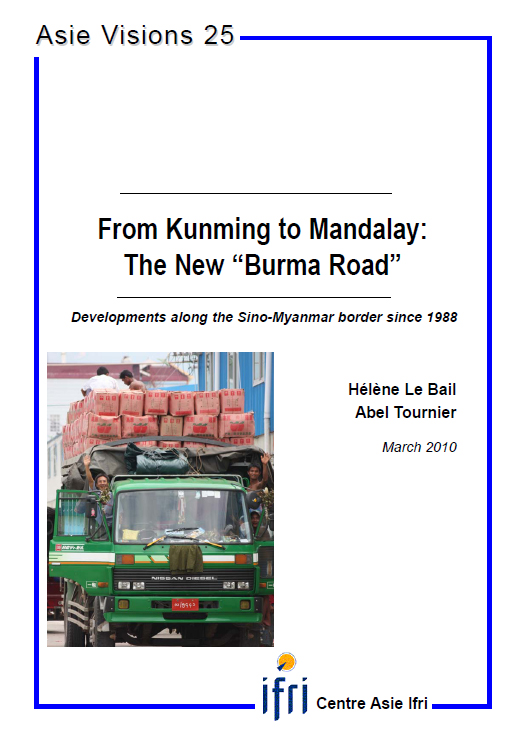From Kunming to Mandalay: The New "Burma Road". Developments along the Sino-Myanmar border since 1988

The present paper aims to describe the vitality and complexity of bilateral trade along the Sino-Myanmar border.
Three aspects have been emphasized. Firstly, the booming of cross-border commercial exchanges must be understood within a larger strategic framework. The connection between the two countries is motivated by economic and security interests: energy security, access to raw materials, cooperation for regional development and (for China) opening up of inner provinces.
Secondly, an analysis of the political and demographic situations in the border areas is important to understand trafficking activities, but also to understand thriving exchanges and the mobility of people. The second part of this paper describes the frontier area in detail.
Finally, this paper underlines the key role of the Sino-Myanmar population (even if they are not the only actors of the trans-border trade). Today's renewal of Chinese identity and community life in Myanmar is both a factor and an effect of thriving bilateral relations.
Download the full analysis
This page contains only a summary of our work. If you would like to have access to all the information from our research on the subject, you can download the full version in PDF format.
From Kunming to Mandalay: The New "Burma Road". Developments along the Sino-Myanmar border since 1988
Related centers and programs
Discover our other research centers and programsFind out more
Discover all our analysesJapan’s Takaichi Landslide: A New Face of Power
Prime Minister Sanae Takaichi has turned her exceptional popularity into a historic political victory. The snap elections of February 8 delivered an overwhelming majority for the Liberal Democratic Party (LDP), driven by strong support from young voters, drawn to her iconoclastic and dynamic image, and from conservative voters reassured by her vision of national assertiveness. This popularity lays the foundation for an ambitious strategy on both the domestic and international fronts.
The U.S. Policy Toward Taiwan Beyond Donald Trump: Mapping the American Stakeholders of U.S.-Taiwan Relations
Donald Trump’s return to the White House reintroduced acute uncertainty into the security commitment of the United States (U.S.) to Taiwan. Unlike President Joe Biden, who repeatedly stated the determination to defend Taiwan, President Trump refrains from commenting on the hypothetical U.S. response in the context of a cross-Strait crisis.

China’s Strategy Toward Pacific Island countries: Countering Taiwan and Western Influence
Over the past decade, China has deployed a diplomatic strategy toward the Pacific Island Countries (PICs). This strategy pursues two main objectives: countering Taiwan's diplomatic influence in the region and countering the influence of liberal democracies in what Beijing refers to as the "Global South."

Opening up the G7 to South Korea to Address Contemporary Global Challenges
The G7’s global influence has diminished as powers like China reshape international governance through initiatives such as BRICS and the Shanghai Cooperation Organisation (SCO). With the G7 now representing just 10 per cent of the world’s population and 28 per cent of global GDP, its relevance is increasingly questioned.









